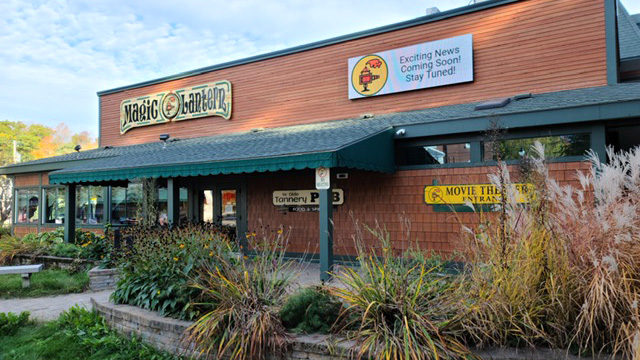
Magic Lantern 4-H Innovation Lab and Learning Center launches in Bridgton after successful community fundraising effort
Orono, Maine — Two years ago, the Maine 4-H Foundation launched a fund development campaign to purchase the Magic Lantern, a theater and restaurant on Depot Street in Bridgton, and expand the community engagement it offers with the development and creation of a 4-H innovation lab and learning center for youth. On Oct. 14, the Magic Lantern transferred ownership to the Maine 4-H Foundation to become a new 4-H Learning Center. The donation of the Magic Lantern is a $2.97 million donation, and a part of the major fund development work to create the new 4-H Learning Center.
The center, which will be led by University of Maine Cooperative Extension, will provide a hub of creative activity for rural youth in the Maine Lakes Region. It will open as soon as the new licenses are in place, which are expected in the coming weeks.
Under Maine 4-H Foundation ownership, the Magic Lantern will continue to offer a three-auditorium theater, a restaurant with movie projection capabilities and a venue for community engagement. The UMaine Extension 4-H youth development program will increase its educational offerings and outreach to schools and educational nonprofit organizations.
In addition, high school and college-age students will have opportunities to gain experience in theater, engineering, small business management, marketing and culinary arts, as well as make connections with local nonprofit and for-profit entities.
The goal is to have revenue from the Magic Lantern theater and restaurant support the building and fund local youth education and community programs, making the facility as self-sustaining as possible.
“Our intention has always been to promote entertainment, culture and education through the Magic Lantern. We lit the torch; 4-H and the University of Maine will continue to run with it. We couldn’t be happier,” says Magic Lantern co-owner Frank Howell.
Snapdragon LLC owned the facility, which opened in February 2008 as a community center with state-of-the-art technology, including high-definition projection and sound systems. Both Snapdragon and the Howell family have made a tremendous donation in making this new project a reality, said Susan Jennings, Maine 4-H Foundation executive director.
In addition to Howell and Jennings, the planning team behind the project included a team of community volunteers and input from school superintendents, headmasters and nonprofit and foundation leaders and educators.
Support for the $4 million fundraising campaign came from community members and businesses, the Kendal C. and Anna Ham Charitable Foundation, Bridgton-Lake Region Rotary, Web Granger Family, Chalmers Insurance Group, Norway Savings Bank, Stephen and Tabitha King Foundation, Stifler Family Foundation and dedicated 4-H donors.
Additionally, earlier this year, U.S. Sen. Angus King and U.S. Rep. Chellie Pingree both advanced congressional earmark funding requests to support the Magic Lantern redevelopment project. The federal appropriations process is ongoing.
Fundraising will continue in support of community education and internship opportunities for youth.
“This new 4-H learning center will grow to offer new and exciting programs for youth in the Lakes Region and connect with our statewide network of learning centers and county Extension offices,” says Maine 4-H Foundation president Carla Lafayette. “It is an incredible opportunity for the entire community and one we will continue to raise funds for as we expand programming.”
The new Magic Lantern 4-H Innovation Lab and Learning Center will focus on educational programming with an emphasis on cross-disciplinary learning, creative thinking and problem solving, says Jennings. The goal is to partner with the University of Maine Foster Center for Innovation. Visual and performing arts programming will include creative writing, play writing, film production, advertising and illustration.
For programming focused on math, design and engineering, the center will partner with area businesses, such as Down East Innovation, RLC Engineering, UMaine, the Maine Mathematics and Science Alliance, 4-H STEM Hubs and local schools — all of which are current participants in 4-H Youth Development programs statewide.
The overarching goal is to increase affordable educational opportunities for rural youth in western Maine, Jennings says.
“Young people growing up in rural Maine do not have the same opportunities and resources that other youth have in the urban areas of Maine,” says Jennings. “4-H has been engaged in experiential education pilot school programs for over 12 years and have successfully increased test scores, raised aspirations, increased attendance and engaged students in career-based learning. We look forward to partnering with this community and the region to offer UMaine programming that can make a difference in the lives of children, youth and their families.”
For more information or to contribute to the project, contact the Maine 4-H Foundation, 207.615.7300; susan.jennings@maine.edu. A video about the initiative is online, as is a donation link.
Contact: Margaret Nagle, nagle@maine.edu
